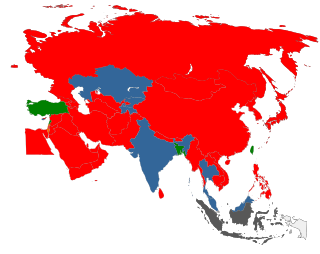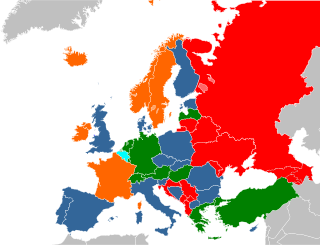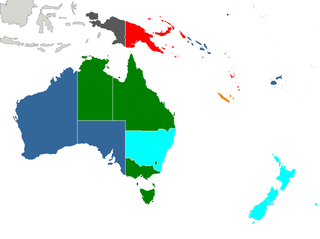Related Research Articles

In Great Britain, the act of engaging in sex as part of an exchange of sexual services for money is legal, but a number of related activities, including soliciting in a public place, kerb crawling, owning or managing a brothel, pimping and pandering, are crimes. In Northern Ireland, which previously had similar laws, paying for sex became illegal from 1 June 2015.

The legality of prostitution in Asia varies by country. There is often a significant difference in Asia between prostitution laws and the practice of prostitution. In 2011, the Asian Commission on AIDS estimated there were 10 million sex workers in Asia and 75 million male customers.
Prostitution in Finland is legal, but soliciting in a public place and organised prostitution are illegal. According to a 2010 TAMPEP study, 69% of prostitutes working in Finland are migrants. As of 2009, there was little "visible" prostitution in Finland as it was mostly limited to private residences and nightclubs in larger metropolitan areas.
Prostitution in Greece is legal at the age of 18, and regulated. It is estimated that fewer than 1,000 women are legally employed as prostitutes and approximately 20,000 women, half of whom are of foreign origin and the other half are Greek, are engaged in illegal prostitution. Many women affected by the economic crisis have turned to prostitution through poverty.
Prostitution in Bolivia is legal and regulated. It is only permitted by registered prostitutes in licensed brothels. Prostitutes must register and must undergo regular health checks for sexually transmitted diseases. The police are allowed to check whether the prostitutes are registered or not, and have attended a clinic during the previous 20 days.
Prostitution in Lebanon is nominally legal and regulated. However, no licences have been issued since 1975. In modern Lebanon, prostitution takes place semi-officially via 'super night clubs', and illegally on the streets, in bars, hotels and brothels. UNAIDS estimate there to be 4,220 prostitutes in the country.

The legality of prostitution in Europe varies by country.
Prostitution in Azerbaijan is illegal but common. Prostitution is an administrative offence and punishable by a fine. Keeping a brothel is a criminal offence and punishable by up to 6 years' imprisonment. In 2017 a draft law proposing to add heavy fines to the punishment for keeping a brothel was before the National Assembly. It has been estimated that there are 25,054 prostitutes in Azerbaijan, some of which are aged 15 to 18.
Prostitution in Suriname is illegal but widespread and the laws are rarely enforced. Human trafficking and Child prostitution are problems in the country. Prostitutes are known locally as "motyo". UNAIDS estimate there to be 2,228 prostitutes in the country.
Prostitution in Croatia is illegal but common. Forcible prostitution, any kind of brothels, or procuring are treated as a felony, while voluntary prostitution is considered to be infraction against public order. Like in many other Southeast European countries, the problem of human trafficking for the purposes of sex is big in Croatia.
Prostitution in Burkina Faso is not specifically prohibited by the law, but soliciting and pimping are illegal. Burkinabe society only accepts sexual intercourse within marriage. In 2009, Voice of America reported that the number of prostitutes in Burkina Faso had increased as a result of the country's poverty. The increase in prostitution has given rise to fears of an increase in the number of Burkinabés infected with HIV and AIDS. UNAIDS estimate there to be 31,000 prostitutes in the country.

The legal status of prostitution in Africa varies widely. It is frequently common in practice, partially driven by the widespread poverty in many sub-Saharan African countries, and is one of the drivers for the prevalence of AIDS in Africa. Senegal and Côte d'Ivoire permit the operations of brothels. In other countries, prostitution may be legal, but brothels are not allowed to operate. In some countries where prostitution is illegal, the law is rarely enforced.
Prostitution in Northern Ireland is governed by the Human Trafficking and Exploitation Act 2015, which makes it illegal to pay for sex in Northern Ireland. Prior to the act coming into effect, prostitution in Northern Ireland was regulated by the same or similar laws to those in England and Wales, as it is elsewhere in the United Kingdom. At that time, prostitution in Northern Ireland was legal subject to a number of restraints which controlled certain activities associated with prostitution, such as soliciting, procuring, living on the proceeds of prostitution (pimping), exploitation of prostitutes, under-age prostitution, and keeping a brothel. However, devolution provided the opportunity for separate legislation in Northern Ireland.

Prostitution law varies widely from country to country, and between jurisdictions within a country. At one extreme, prostitution or sex work is legal in some places and regarded as a profession, while at the other extreme, it is a crime punishable by death in some other places.
Prostitution in Namibia is legal and a highly prevalent common practice. Related activities such as solicitation, procuring and being involved in the running of a brothel are illegal. A World Bank study estimated there were about 11,000 prostitutes in Namibia.
Prostitution in Botswana is not illegal, but laws such as public disorder, vagrancy, loitering and state recognised religious provisions are used to prosecute prostitutes. Related activities such as soliciting and brothel keeping are illegal. Botswana has made proposals to make prostitution legal to prevent the spread of AIDS. However, there has been mass opposition to it by the Catholic Church. Prostitution is widespread and takes place on the street, bars, hotels, brothels and the cabs of long-distance trucks.
Prostitution in Algeria is legal but most related activities such as brothel-keeping and solicitation are criminalised. Coastal resorts, particularly Tichy, are destinations for sex tourism. As of 2017 there were two brothels in Algeria.

Legality of prostitution in the Americas varies by country. Most countries only legalized prostitution, with the act of exchanging money for sexual services legal. The level of enforcement varies by country. One country, the United States, is unique as legality of prostitution is not the responsibility of the federal government, but rather state, territorial, and federal district's responsibility.

Prostitution in Oceania varies greatly across the region. In American Samoa, for instance, prostitution is illegal, whereas in New Zealand most aspects of the trade are decriminalised.
Prostitution in Fiji is legal, but most activities connected with it are illegal: brothel keeping, pimping and buying or selling sex in public. Street workers make up the bulk of Fiji's prostitutes. Many of the prostitutes are Asian, especially Chinese that provide sexual services for the growing number of tourists arriving in the country and also locals. Some come into the country on student visas. In 2014, it was estimated that there were 857 sex workers in Fiji. Even though buying and selling sex in public is illegal in Fiji, police have no legal authority to arrest prostitutes without an official report being lodged for the police to take action.
References
- ↑ "The Legal Status of Prostitution by Country". ChartsBin. Retrieved 21 February 2018.
- ↑ "100 Countries and Their Prostitution Policies -". ProCon. Retrieved 21 February 2018.
- ↑ "Country Report on Human Rights Practices in Luxembourg". State.gov. 2008-03-11. Retrieved 2010-03-31.
- ↑ "A summary of the prostitution regulations in the EU member states" (PDF). www.europarl.europa.eu. European Parliament. Retrieved 13 September 2015.
Luxembourg: Procuring is prohibited, and the keeping of brothels. Buying sex from children under 18 is illegal, but prostitution in itself is not criminal.
- ↑ "Country Report on Human Rights Practices in Luxembourg". U.S. Department of State. 6 March 2007. Retrieved 2 November 2015.
- ↑ "How many Prostitutes?". Exeter University. Retrieved 10 February 2018.
- ↑ Huberty, Martine (7 February 2018). "Prostitution law reform adopted". Delano - Luxembourg in English (in French). Retrieved 29 May 2018.
- ↑ "Luxembourg passes landmark prostitution bill criminalising clients". New Europe. 7 February 2018. Retrieved 29 May 2018.
- ↑ Schalekamp, Mark (2016). This is Europe. Lulu.com. ISBN 9789081656603.
- ↑ "Sex Work". Services4SexWorkers. Retrieved 21 February 2018.
- ↑ "Residents say Luxembourg's "Bronx" is worsening". Luxembourg Times. 20 May 2014. Retrieved 21 February 2018.
- ↑ "Prostitution patrol in Luxembourg City's Gare district". Luxembourg Times. 3 July 2014. Retrieved 21 February 2018.
- ↑ "Prostitution in Luxembourg". Statistics Portal of the Grand Duchy of Luxembourg. 18 June 2012. Retrieved 21 February 2018.
- ↑ "A Luxembourg model for prostitution law - Delano - Luxembourg in English". Delano (in French). 1 March 2016. Retrieved 22 February 2018.
- ↑ "Un plan d'action national bientôt dévoilé: "Il faut rompre le silence et le tabou autour de la prostitution"". Wort.lu (in French). 14 January 2016. Retrieved 22 February 2018.
- 1 2 "Government Strategy Aims to Make Prostitution Safer, Cut Ties with Human Trafficking". Chronicle. 29 June 2016. Retrieved 22 February 2018.
- ↑ "Prostitution au Luxembourg: "EXIT": une porte de sortie pour les prostituées". Wort (in French). 2 December 2014. Retrieved 22 February 2018.
- 1 2 3 "Luxembourg 2017 Trafficking in Persons Report". U.S. Department of State. Archived from the original on 3 July 2017. Retrieved 21 February 2018.
 This article incorporates text from this source, which is in the public domain .
This article incorporates text from this source, which is in the public domain .